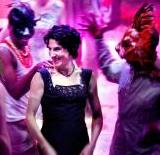SITE GUIDE
SEARCH
REVIEWS
FEATURES
NEWS
Etcetera and
Short Term Listings
LISTINGS
Broadway
Off-Broadway
NYC Restaurants
BOOKS and CDs
OTHER PLACES
Berkshires
London
California
DC
Philadelphia
Elsewhere
QUOTES
On TKTS
PLAYWRIGHTS' ALBUMS
LETTERS TO EDITOR
FILM
LINKS
MISCELLANEOUS
Free Updates
Masthead
Writing for Us
A CurtainUp  London Review
London Review
 London Review
London ReviewMuch Ado About Nothing
|
I do love nothing in the world as well as you. Is that not strange?
---- Benedick |

Tamsin Greig as Beatrice
(Photo: Simon Annand) |
Set in 1950s Cuba under Fulgencio Batista's regime, this production simply oozes atmosphere. There is a sense of a strict social hierarchy and war always lurking on the horizon but in between there is lots of fun, music, dancing, not to mention the cigar smoking and rum drinking. Lez Brotherston's set is dilapidated yet sunny, with flaky brick backgrounds, slow ceiling fans, a rusty staircase and a stone floor.
The live band plays South American rhythms and the cast breaks into energetic dance at several points. Shakespeare's music is acculturated into the production's setting very successfully. The bard Balthasar (Yvette Rochester-Duncan) is played as a nightclub diva, and she does a slow, jazzy rendition of "Sigh no more". The masked ball scene is a carnivalesque romp with brightly coloured, flamboyant masks. As the men and women dance around each other in spirited combative steps throughout the production, Benedick's final exhortation "Let's have a dance" does not for once seem contrived.
Nevertheless, the cornerstone to every production of Much Ado has to be the "merry war" between Beatrice and Benedick. Tamsin Greig and Joseph Millson make a fantastically-matched pair — in the bristling banter, the near crisis of Hero's defamation and the poignant love story. It is no surprise that Tamsin Greig, one of Britain's finest comic actors, should make a hilariously funny Beatrice, but her serious acting abilities are a revelation. Joseph Millson, the star of the RSC's Spanish Golden Age, has just the right mix of the soldier and the jester, with insight yet arrogance and repartee which is bested by Beatrice in almost every round. Their "skirmish of wit" which develops into a moving romance is a delight to watch as they stray from their stereotypes of unmarriagable shrew and determined bachelor. During the scenes of verbal wit, any obscure jokes were well explicated by helpfully expansive direction. The physical humour of the gulling scenes was also really entertaining where Benedick and Beatrice demonstrate that they are both incredibly inept at stealth.
The other pair of lovers are well-suited to their role as more serious counterpart. Morven Christie as Hero is the largely silent victim of male slander and presumption. Her innocence is clear from her costume with high, ribboned ponytail and pink dress with flared skirt. Adam Rayner is a young and impressionable Claudio in a portrayal which doesn't balk at showing his less than satisfactory characteristics.
The power struggle between brothers Don Pedro (Patrick Robinson) and Don John (Jonny Weir) constitutes the political background which intrudes upon the lovers' happiness. Patrick Robinson is a forceful leader who receives obedience and respect from the people around him, while Jonny Weir is a saturnine Don John who causes sudden silence to descend upon the company when he enters. When Don John assumes Castro rebel garb after his flight from his brother's court, we see how this is a society on the brink of upheaval, enjoying just a glimpse of mirth and love.
|
MUCH ADO ABOUT NOTHING
Written by William Shakespeare Directed by Marianne Elliot Starring: Tamsin Greig, Joseph Millson With: Patrick Robinson, Jonny Weir, Adam Rayner, Jamie Ballard, Geoffrey Lumb, Simon Bubb, Curtis Flowers, Nicholas Day, Leon Tanner, Morven Christie, Amy Brown, Caroline Wildi, Yvette Rochester-Duncan, Bette Bourne, Steven Beard, Christopher Davies, Shane Frater, Sam O'Mahony-Adams, Patrick Romer, John Heffernan Lighting: Neil Austin Music: Olly Fox Sound Design: Christopher Shutt Design: Lez Brotherston Running time: Three hours with one interval Box Office: 0870 950 0935 Booking to 6th January 2007 Reviewed by Charlotte Loveridge on 13th December 2006 performance at the Novello Theatre, Aldwych, London, WC2 (Tube: Charing Cross) |




